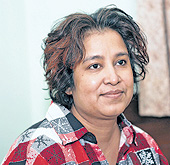 |
I will never compromise,” Taslima Nasreen had told me on the morning of November 27. Late evening on the previous day, when she was still staying at Delhi’s Rajasthan Bhavan, she had agreed to meet me. I had booked the earliest flight out of Calcutta, but she had already been removed. She had been woken up in the dead of night, bundled into a vehicle and taken to a house on a hill guarded day and night by heavily armed men.
But even then — harried, harassed and in hiding — Nasreen had insisted that she would never trade her artistic integrity and freedom of expression for anything in the world. Yet just days after that she dropped the bombshell. In a spectacular about-turn, on November 30, Nasreen announced that she was ready to withdraw certain controversial passages from her book Dwikhandito.
Wasn’t that a huge compromise, you ask her now. Nasreen turns the question right back at you. “Instead of me answering what made me finally agree to withdraw the so-called controversial pages from my book, I would like to ask all of secular, democratic India, why did I have to do it? Why did they allow this to happen?”
Today, Nasreen feels that she was really left with no other alternative. “What were my choices,” she asks. “I am tired of struggling alone. For 13 long years I fought for freedom and for freedom of expression. Today I had to bow down, not to the forces of fundamentalism, but to the silence of all of secular democratic India.” Then, on a conciliatory note, she adds, “But like I said, it was not my intention to hurt the sentiments of anybody in this country.”
Though Nasreen does not say it in so many words, part of the reason for her capitulation clearly stems from her desperation to go “home” to Calcutta. The desperation is evident when she speaks to you on her cell phone — now her only link to the world outside. “I am scared that all that I am saying may go against me. I really want to go back home to Calcutta. I don’t want to jeopardise my chances. Maybe death will be my only option if I can’t go back to Calcutta.”
And then she says slowly, “I am tired of it all. Sometimes I wish I could settle down like everybody else. I had set up a home in Calcutta. I had built up a library, where I liked to sit and read and sip tea. I had grown plants. For the first time I was beginning to get comfortable.”
Indeed, she had become so comfortable in the city that she would often be seen queuing up for tickets at the Academy of Fine Arts or browsing through the bookshops of College Street.
That easy sense of freedom changed, Taslima says, about three months ago when senior police officials came to her house and told her that she could cause communal unrest if she did not leave the state. She was told that it was also dangerous for her to remain here as she could be killed any time. As far as Taslima is concerned, on November 21, the bomb that was ticking away for months had finally exploded. “The police told me that there was a car waiting for me downstairs and that I must leave immediately. I didn’t even get time to pack a suitcase.”
Being shunted around, Taslima is reminded of her escape from Bangladesh and the different hideouts where she was kept when the clerics wanted her head for her radical utterances. “Sometimes I would be woken up in the middle of the night and driven to another location. I would be wrapped in blankets and placed in the backseat of a car under suitcases so that I wouldn’t be discovered.”
Today, a tired Taslima intones, “All I wanted to do was write. I am not a religious person or a political person. But I have got dragged into both.” A fatalistic note creeps into her voice as she says that death awaits her wherever she goes. “But I had embraced life in Calcutta,” she says. “I had enormous faith in Calcutta, and its ability to understand and support my fight for freedom of expression. My love for Calcutta stems from this. But maybe one day, like the two pages of Dwikhandito, I will also have to withdraw this love.”










